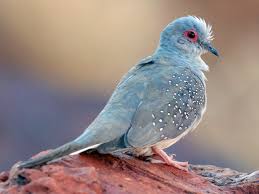
Diamond Dove
Conditions of detention
Diamond Doves require a spacious cage or aviary that allows for flight and social interaction. The cage should be equipped with perches, swings, and toys to keep them entertained. It’s important to place the cage in a well-lit area away from drafts and direct sunlight.
Useful Fact: Diamond Doves are social birds that do well in pairs or small groups. They thrive in environments where they can interact with other doves and observe human activity.
Nutrition and diet
A balanced diet for Diamond Doves includes a high-quality seed mix or pellets supplemented with fresh fruits and vegetables. Foods such as millet, canary seed, spinach, kale, and small amounts of grated carrot are excellent choices. Providing grit and calcium supplements can aid in digestion and bone health.
Useful Fact: Diamond Doves require access to clean, fresh water at all times, as they can dehydrate quickly due to their small size and active metabolism.
Health
Diamond Doves are generally hardy birds but can be prone to certain health issues such as respiratory infections, mites, and nutritional deficiencies. Regular observation and maintaining a clean environment are essential for preventing diseases.
Useful Fact: Monitor their droppings for changes in color or consistency, as these can be early indicators of health problems. Regular veterinary check-ups can help ensure they remain healthy.
Grooming and care
Diamond Doves groom themselves by preening their feathers and enjoy bathing. Providing a shallow dish of water for bathing or misting them lightly with water can help maintain healthy feathers.
Useful Fact: Regularly cleaning the cage and providing fresh bedding helps prevent the spread of parasites and bacteria.
Education and training
Diamond Doves are not typically trained like parrots, but they can become accustomed to their owner’s presence and routines. Handling should be gentle to avoid stress.
Useful Fact: Finches appreciate a predictable environment and routine, which can help reduce stress and encourage natural behaviors.
Toys and entertainment
While Diamond Doves do not engage with toys like parrots, they enjoy exploring their environment and foraging for food. Providing different textures and surfaces for them to interact with can help keep them engaged.
Useful Fact: Allowing doves to fly freely in a secure environment can provide the mental and physical stimulation they need.
Safety
Ensure that the cage is free of sharp edges and that the bar spacing is appropriate to prevent escape or injury. Keep them away from toxic substances, including certain household plants and fumes.
Useful Fact: Avoid using non-stick cookware around Diamond Doves, as the fumes can be toxic and even fatal to birds.
Accessories
Diamond Doves require nesting boxes or platforms for breeding and resting. Providing perches of varying sizes and materials can help maintain foot health.
Useful Fact: Nesting materials such as straw, twigs, and leaves should be provided to encourage natural nesting behaviors.
Socialization
Diamond Doves are social birds and thrive in flocks. They form strong pair bonds and enjoy interacting with other doves and their human caregivers.
Useful Fact: Spending time observing and interacting with your doves can help build trust and strengthen your bond with them.
Travel and Transportation
When traveling with Diamond Doves, use a secure and well-ventilated travel carrier. It’s important to keep the carrier covered during transport to reduce stress.
Useful Fact: Acclimating doves to the travel carrier before trips can help reduce stress and anxiety during transport.
Behavior and psychology
Diamond Doves exhibit a range of behaviors and vocalizations that indicate their mood and health. Understanding these signals is essential for proper care.
Useful Fact: Diamond Doves are known for their gentle cooing, which is part of their social interactions and can indicate contentment and bonding.
Legal aspects
In most areas, there are few legal restrictions on keeping Diamond Doves as pets, but it is important to ensure that any doves purchased are from reputable breeders or pet stores and not taken from the wild.
Useful Fact: Always check local regulations to ensure compliance with laws regarding pet ownership and breeding, as some areas may have specific requirements.


